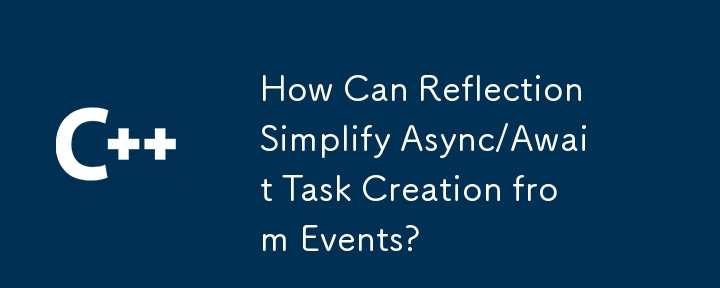

Task Completion from Events Using Reflection
The async/await pattern allows for easy task creation upon event firing. However, this pattern requires a specific FromEvent method for each event. To simplify this, a more generalized solution was desired, where one FromEvent method could handle any event on any instance.
While passing the event directly or as a string faced limitations, reflection offered a potential path. However, dynamically creating a handler to access the TaskCompletionSource in reflection posed challenges.
Custom DynamicMethod Invocation
The key solution involved creating a dynamic method that contained the desired logic. This method's first parameter would be a TaskCompletionSourceHolder instance. This allowed for accessing the TaskCompletionSource from within the generated IL.
Helper Class and Extension Method
A helper class, TaskCompletionSourceHolder, encapsulated the TaskCompletionSource and provided a method to set its result. The extension method FromEvent took the source object and event name as parameters. It:
Supported Event Types
This solution supports any void-returning event, regardless of the parameter list. Additional improvements can be made to support any return value type if needed.
Example Usage
Below is an example of how to use the custom FromEvent method:
static async void Run() {
object[] result = await new MyClass().FromEvent("Fired");
// Output: 123, abcd
}
public class MyClass {
// Event delegate type with two parameters
public delegate void TwoThings(int x, string y);
// Constructor to trigger event after a delay
public MyClass() {
new Thread(() => {
Thread.Sleep(1000);
Fired(123, "abcd");
}).Start();
}
// Event using the custom TwoThings delegate
public event TwoThings Fired;
}Using our generalized FromEvent method, we can specify any event type without the need for an explicit task type, thus simplifying event handling in async/await scenarios.
The above is the detailed content of How Can Reflection Simplify Async/Await Task Creation from Events?. For more information, please follow other related articles on the PHP Chinese website!
 The difference between win7 32-bit and 64-bit
The difference between win7 32-bit and 64-bit
 How to cancel Douyin account on Douyin
How to cancel Douyin account on Douyin
 number_format usage
number_format usage
 Computer system vulnerability repair methods
Computer system vulnerability repair methods
 What is the difference between USB-C and TYPE-C
What is the difference between USB-C and TYPE-C
 What are the programming languages?
What are the programming languages?
 Okex official website
Okex official website
 mybatis first level cache and second level cache
mybatis first level cache and second level cache




